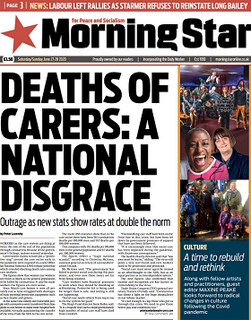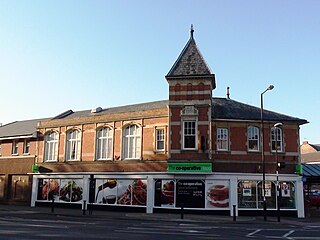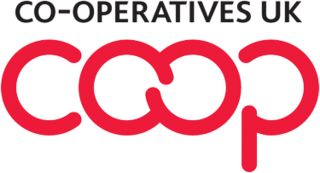
The Times is a British daily national newspaper based in London. It began in 1785 under the title The Daily Universal Register, adopting its current name on 1 January 1788. The Times and its sister paper The Sunday Times are published by Times Newspapers, since 1981 a subsidiary of News UK, in turn wholly owned by News Corp. The Times and The Sunday Times, which do not share editorial staff, were founded independently, and have only had common ownership since 1966. In general, the political position of The Times is considered to be centre-right.

A cooperative is "an autonomous association of persons united voluntarily to meet their common economic, social, and cultural needs and aspirations through a jointly-owned enterprise". Cooperatives are democratically owned by their members, with each member having one vote in electing the board of directors. Cooperatives may include:

The Observer is a British newspaper published on Sundays. In the same place on the political spectrum as its sister papers The Guardian and The Guardian Weekly, whose parent company Guardian Media Group Limited acquired it in 1993, it takes a social liberal or social democratic line on most issues. First published in 1791, it is the world's oldest Sunday newspaper.

Guardian Media Group plc (GMG) is a British-based mass media company owning various media operations including The Guardian and The Observer. The group is wholly owned by the Scott Trust Limited, which exists to secure the financial and editorial independence of The Guardian in perpetuity.

The Morning Star is a left-wing British daily newspaper with a focus on social, political and trade union issues, and is both the largest and longest-running socialist newspaper in Britain. Originally founded in 1930 as the Daily Worker by the Communist Party of Great Britain (CPGB), ownership was transferred from the CPGB to an independent readers' co-operative in 1945. The paper was then renamed and reinvented as the Morning Star in 1966. The paper describes its editorial stance as in line with Britain's Road to Socialism, the programme of the Communist Party of Britain.

Metro is the United Kingdom's highest-circulation freesheet newspaper. It is published in tabloid format by DMG Media. The newspaper is distributed from Monday to Friday mornings on trains and buses, and at railway/Underground stations, airports and hospitals across selected urban areas of England, Wales and Scotland. Copies are also handed out to pedestrians.

The Co-operative Bank plc is a retail and commercial bank in the United Kingdom, with its headquarters in Balloon Street, Manchester.

Dame Pauline Green, is a former Labour and Co-operative Member of the European Parliament and former Leader of the Parliamentary Group of the Party of European Socialists (PES). As leader of the PES, she had a central role in the controversy surrounding the failure to discharge the European Commission (EC)'s 1996 budget, bringing the first motion of censure against the commission but voting against it. She then changed her position following corruption allegations raised by EC official Paul van Buitenen to call for Jacques Santer to react promptly or be sacked. Green lost the leadership of the PES in 1999, which was attributed in part to her handling of the incident.

Co-operative Group Limited, trading as Co-op, is a British consumer co-operative with a family of retail businesses including food retail, wholesale, e-pharmacy, insurance and legal services, and funeral care.

The Phone Co-op is a consumer co-operative in the United Kingdom, which provides landline, mobile telephone and Internet services, including web hosting and broadband. Now part of the Midcounties Co-operative, the largest independent co-operative in the UK, it is owned by its customer-members who democratically control the business and who share in its profits. This makes The Phone Co-op the only telephone co-operative in the UK.
The United Kingdom is home to a widespread and diverse co-operative movement, with over 7000 registered co-operatives owned by 17 million individual members and which contribute £34bn a year to the British economy. Modern co-operation started with the Rochdale Pioneers' shop in the northern English town of Rochdale in 1844, though the history of co-operation in Britain can be traced back to before 1800. The British co-operative movement is most commonly associated with The Co-operative brand which has been adopted by several large consumers' co-operative societies; however, there are many thousands of registered co-operative businesses operating in the UK. Alongside these consumers' co-operatives, there exist many prominent agricultural co-operatives (621), co-operative housing providers (619), health and social care cooperatives (111), cooperative schools (834), retail co-operatives, co-operatively run community energy projects, football supporters' trusts, credit unions, and worker-owned businesses.

A consumers' co-operative is an enterprise owned by consumers and managed democratically and that aims at fulfilling the needs and aspirations of its members. Such co-operatives operate within the market system, independently of the state, as a form of mutual aid, oriented toward service rather than pecuniary profit. Consumers' cooperatives often take the form of retail outlets owned and operated by their consumers, such as food co-ops. However, there are many types of consumers' cooperatives, operating in areas such as health care, insurance, housing, utilities and personal finance.

Co-operatives UK is a British co-operative federation described as "the central membership organisation for co-operative enterprise throughout the UK". It was founded in 1870 as the Co-operative Central Board, changing its name to the Co-operative Union before finally becoming Co-operatives UK following its merger with the Industrial Common Ownership Movement (ICOM) in 2001. Historically associated with the consumer co-operatives, the merger broadened its scope to include worker co-operatives and it now exists to support and promote the values of the entire co-operative movement throughout the UK.

The Co-operative Congress is the national conference of the UK Co-operative Movement. The first of the modern congresses took place in 1869 following a series of meetings called the "Owenite Congress" in the 1830s. Members of Co-operatives UK send delegates to the annual congress, where reports of national bodies are made and debates held on subjects of importance to the Co-operative Movement. The meetings also include the Annual General Meeting of Co-operatives UK.
The history of the cooperative movement concerns the origins and history of cooperatives across the world. Although cooperative arrangements, such as mutual insurance, and principles of cooperation existed long before, the cooperative movement began with the application of cooperative principles to business organization.

The Co-operative Press is a co-operative whose principal activity is the publication of Co-op News. The society's stated mission is to "connect, champion and challenge the global co-operative movement". The co-operative's members are the subscribers of Co-op News.

The Guardian is a British daily newspaper. It was founded in 1821 as The Manchester Guardian, and changed its name in 1959. Along with its sister papers The Observer and The Guardian Weekly, The Guardian is part of the Guardian Media Group, owned by the Scott Trust. The trust was created in 1936 to "secure the financial and editorial independence of The Guardian in perpetuity and to safeguard the journalistic freedom and liberal values of The Guardian free from commercial or political interference". The trust was converted into a limited company in 2008, with a constitution written so as to maintain for The Guardian the same protections as were built into the structure of the Scott Trust by its creators. Profits are reinvested in journalism rather than distributed to owners or shareholders. It is considered a newspaper of record in the UK.
Sydney Robert Elliott was a British newspaper editor.
















